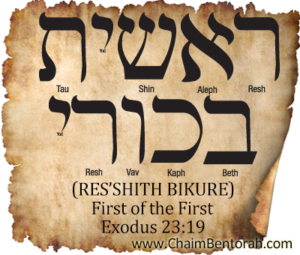Hebrew Word Study – First of the First – Res’shith Bikure – Resh Aleph Shin Yod Taw Beth Kap Vav Resh Yod
Exodus 23:19: “The first of the first fruits of thy land thou shalt bring into the house of the Lord thy God, Thou shalt not seethe a yearling in his mother’s milk.”
 The word fruit is thrown around a lot. “By their fruits you shall known them…” We have the “fruits of the Spirit,” and the vine that does not bear fruit etc. Fruit is an important word. It is quite important here as God is speaking of the first of the first fruits.
The word fruit is thrown around a lot. “By their fruits you shall known them…” We have the “fruits of the Spirit,” and the vine that does not bear fruit etc. Fruit is an important word. It is quite important here as God is speaking of the first of the first fruits.
Fruit in Hebrew is parah which has the idea of off spring, or results, accomplishments. Hence we talk of the fruit or accomplishments of our labors. However, when Scripture speaks of the first fruits, it is using a different word. That word, as used in Exodus 23:19, is bokar. This has the idea of first or to be early. This specifically speaks of the first fruits. Traditionally the word bokar represented an agricultural produce. The tradition of first fruits was not only practiced by the Hebrews but the Greeks and the Romans as well. This was a form of taxation, where the citizens brought the first of their produce to the temple or governmental hall where it was sold and the proceeds used to pay wages, the light bill etc. In the same way the Book of Exodus refers to a tithe (tax) to support the temple. So why the bokar (first fruits) and not just the parah (results, fruit). This passage could have said to bring the rosh of the parah, which means just the first of the fruits, but instead it says the rosh of the bokar, which would be the first of the first fruit. In other words this is a reference to the best of the first fruits, the best of the best. This is followed by the command that the yearling goat was not to be boiled in it’s mother’s milk. That sounds odd, yet it is being very specific.
Would you like Chaim Bentorah as your personal Hebrew teacher?
|
|
I wonder if Paul did not have this passage in mind when he wrote I Corinthians 15:22-23: “But as in Adam all die, even so in Christ shall all be made alive. But every man in his own order: Christ the firstfruits; afterward they that are in Christ at his coming.”
The yearling was a gedi, which is a goat. It is suggested that this is the goat that was brought before the High Priest on Yom Kippur. Two goats were brought before the High Priest actually. A lot was thrown and the winner was taken and thrown off a cliff, this was known as the scapegoat. The other goat was sacrificed as a sin offering. It is believed that this goat that was sacrificed is the gedi which was not to be boiled in it’s mother’s milk.
I would suggest that this is a picture of Jesus who the first and the best of the first fruits, the best that God had to offer us and like the goat in Exodus, he was sacrificed as a sin offering for us. And what does the idea of not being boiled in its mother’s milk represent? Most commentators believe it was a prohibition against an idolatrous practice in Egypt where at the end of their harvest they would boil a goat in its mother’s milk and then sprinkle the broth as some sort of ritual which would bring about a more productive harvest the next year. That would make sense for that point in time as the Hebrews needed to distance themselves from the idolatry of Egypt, but why continue the practice today when such things are forgotten?
If I am right and this is a Messianic picture, maybe God is trying to suggest something about the future Messiah being born of a virgin and that God is going to bring about a fruitful harvest of souls from the sacrifice of the Messiah who will be uniquely and divinely conceived? Or maybe I am just a dusty old professor trying to make some quantum leap.
Hi there! Thank you for reading this Daily Word Study. Can I ask a favor? Share this Daily Word Study with your friends on Facebook and Twitter by clicking one of the icons below.
Thanks & Blessings, it means a lot to me!







I have an Israeli friend who will not eat a cheeseburger because of the meat with cheese is this complication. It’s mother’s milk. How little we understand as Christians and also some Jews into the intentions of our Lord in the wisdom of scripture.
Thank you Chaim for your wisdom and insight!
For me this is a major piece of the puzzle dropping in the right place.
Thanks again
Very interesting indeed!!! I can understand that explanation.
Thanks Chaim, I’ve been thinking about the boiling of goats and wondering if that has an even deeper meaning. This sort of answers it but I’m still not satisfied so I’ll keep digging and praying for a clearer understanding of this passage. Hope your doing well.
Re:”God is trying to suggest something about the future Messiah being born of a virgin and that God is going to bring about a fruitful harvest of souls from the sacrifice of the Messiah who will be uniquely and divinely conceived? ”
If Messiah is symbolized by the goat, what there symbolizes the mother’s milk and not boiling therein. Thank you Teacher